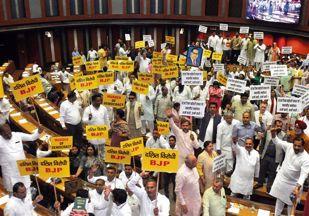Activists working for transparency in governance have a reason to be alarmed at the Modi government’s move to change rules framed under the Right to Information (RTI) Act. The government’s track-record on transparency is uninspiring. It has just hurried through the Lok Sabha amendments to 40 laws, including one that ensures anonymity in political funding. The only minor legislative change it has chosen to forget relates to replacing the expression “Leader of Opposition” with “leader of the largest party in Parliament” and this is not without a motive. The purpose is to delay/scuttle the appointment of a Lokpal. Since the RTI Act is one of the most empowering laws passed in India, any attempt to dilute it is bound to invite disapproval and criticism.
Some of the rules put up on the official site for public comments will discourage the healthy trend of RTI activism in this country. These include raising the application fee to Rs 50, passing on the cost of reply and postage to the applicant, rejection of a hand-written application and an application exceeding 500 words. These may appear harmless but collectively they raise the bar for access to information. The provision for closing an RTI file on the death of the applicant, requiring the restart of the process for seeking information, serves, even if inadvertently, to aggravate risk to the life of public-spirited citizens.
Besides, citizens seeking information about their entitlements or rights are being put to hurdles seen in courts. In a 2013 case the Supreme Court had ruled that RTI appeals and complaints are not in the nature of a civil or criminal dispute, and information commissions established under the RTI Act are not quasi-judicial tribunals. An RTI application/appeal therefore should not end with the death of the applicant. If states too follow the Central RTI rules, the level of risk and costs for RTI activists can be well imagined. The government should instead pick up more suitable Information Commissioners rather than handing over these posts to loyalists and find ways for faster disposal of RTI applications. The apex court has questioned the functioning of information commissions and quality of orders passed.



























